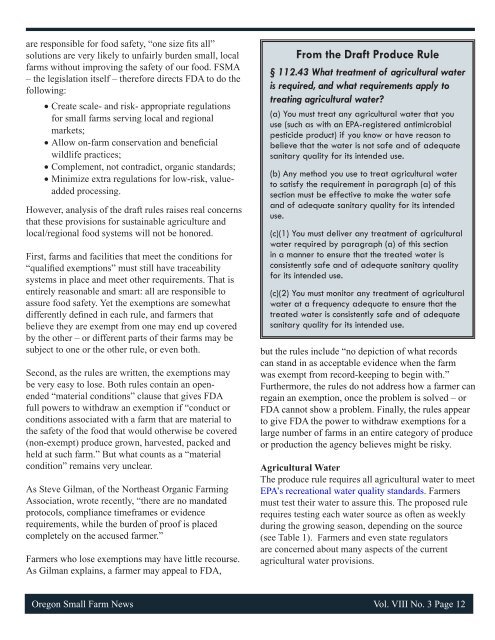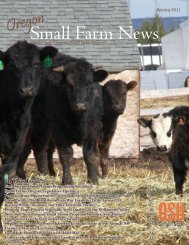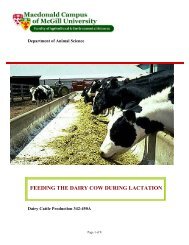Small Farm News - Oregon Small Farms - Oregon State University
Small Farm News - Oregon Small Farms - Oregon State University
Small Farm News - Oregon Small Farms - Oregon State University
Create successful ePaper yourself
Turn your PDF publications into a flip-book with our unique Google optimized e-Paper software.
are responsible for food safety, “one size fits all”<br />
solutions are very likely to unfairly burden small, local<br />
farms without improving the safety of our food. FSMA<br />
– the legislation itself – therefore directs FDA to do the<br />
following:<br />
• Create scale- and risk- appropriate regulations<br />
for small farms serving local and regional<br />
markets;<br />
• Allow on-farm conservation and beneficial<br />
wildlife practices;<br />
• Complement, not contradict, organic standards;<br />
• Minimize extra regulations for low-risk, valueadded<br />
processing.<br />
However, analysis of the draft rules raises real concerns<br />
that these provisions for sustainable agriculture and<br />
local/regional food systems will not be honored.<br />
First, farms and facilities that meet the conditions for<br />
“qualified exemptions” must still have traceability<br />
systems in place and meet other requirements. That is<br />
entirely reasonable and smart: all are responsible to<br />
assure food safety. Yet the exemptions are somewhat<br />
differently defined in each rule, and farmers that<br />
believe they are exempt from one may end up covered<br />
by the other – or different parts of their farms may be<br />
subject to one or the other rule, or even both.<br />
Second, as the rules are written, the exemptions may<br />
be very easy to lose. Both rules contain an openended<br />
“material conditions” clause that gives FDA<br />
full powers to withdraw an exemption if “conduct or<br />
conditions associated with a farm that are material to<br />
the safety of the food that would otherwise be covered<br />
(non-exempt) produce grown, harvested, packed and<br />
held at such farm.” But what counts as a “material<br />
condition” remains very unclear.<br />
As Steve Gilman, of the Northeast Organic <strong>Farm</strong>ing<br />
Association, wrote recently, “there are no mandated<br />
protocols, compliance timeframes or evidence<br />
requirements, while the burden of proof is placed<br />
completely on the accused farmer.”<br />
<strong>Farm</strong>ers who lose exemptions may have little recourse.<br />
As Gilman explains, a farmer may appeal to FDA,<br />
From the Draft Produce Rule<br />
§ 112.43 What treatment of agricultural water<br />
is required, and what requirements apply to<br />
treating agricultural water<br />
(a) You must treat any agricultural water that you<br />
use (such as with an EPA-registered antimicrobial<br />
pesticide product) if you know or have reason to<br />
believe that the water is not safe and of adequate<br />
sanitary quality for its intended use.<br />
(b) Any method you use to treat agricultural water<br />
to satisfy the requirement in paragraph (a) of this<br />
section must be effective to make the water safe<br />
and of adequate sanitary quality for its intended<br />
use.<br />
(c)(1) You must deliver any treatment of agricultural<br />
water required by paragraph (a) of this section<br />
in a manner to ensure that the treated water is<br />
consistently safe and of adequate sanitary quality<br />
for its intended use.<br />
(c)(2) You must monitor any treatment of agricultural<br />
water at a frequency adequate to ensure that the<br />
treated water is consistently safe and of adequate<br />
sanitary quality for its intended use.<br />
but the rules include “no depiction of what records<br />
can stand in as acceptable evidence when the farm<br />
was exempt from record-keeping to begin with.”<br />
Furthermore, the rules do not address how a farmer can<br />
regain an exemption, once the problem is solved – or<br />
FDA cannot show a problem. Finally, the rules appear<br />
to give FDA the power to withdraw exemptions for a<br />
large number of farms in an entire category of produce<br />
or production the agency believes might be risky.<br />
Agricultural Water<br />
The produce rule requires all agricultural water to meet<br />
EPA’s recreational water quality standards. <strong>Farm</strong>ers<br />
must test their water to assure this. The proposed rule<br />
requires testing each water source as often as weekly<br />
during the growing season, depending on the source<br />
(see Table 1). <strong>Farm</strong>ers and even state regulators<br />
are concerned about many aspects of the current<br />
agricultural water provisions.<br />
<strong>Oregon</strong> <strong>Small</strong> <strong>Farm</strong> <strong>News</strong> Vol. VIII No. 3 Page 12















